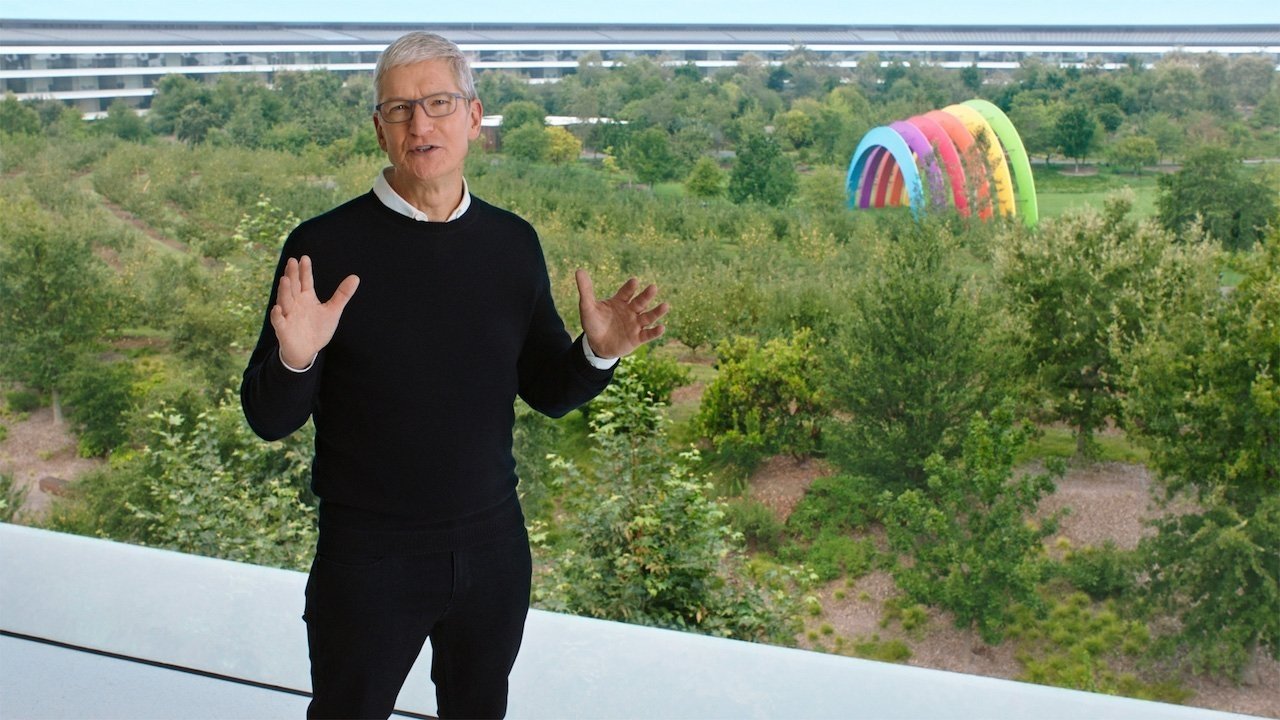Apple targeting date near March 8 for iPhone SE, iPad Air spring keynote
Apple is reportedly considering a date on or near March 8 to hold a spring event for a new iPhone SE, an updated iPad, and potentially a new Mac.

Tim Cook at Apple Park
The potential spring event date is not set in stone, but sources told Bloomberg that Apple is targeting a day around March 8 for its next virtual event.
However, the publication cautioned that production delays or other changes could force Apple to switch the date of the event. March 8 is a Tuesday, which is a day of the week that Apple historically holds new product launches.
During the event, Apple is largely expected to debut a new iPhone SE 3 and refreshed iPad Air. The iPhone is rumored to share a similar design to previous iPhone SE models, but will pack a faster A15 chipset and 5G connectivity. The iPad Air is also getting an A15 chip and 5G, Bloomberg reported.
Although the 2022 iPhone SE model will be a muted update, reports suggest that a more significant overhaul of the lower-cost iPhone could take place in 2024.
Bloomberg claims that Apple could also release a new Mac model with an Apple Silicon chip, though the publication did not add any additional detail. Apple is thought to be working on a new 27-inch iMac Pro device.
Additionally, the sources told the publication that Apple's iOS 15.4, which includes Face ID support for masks and Universal Control, could arrive in the first half of March.
If the March 8 date does pan out, Apple will likely send out media invites to the keynote about a week before.
Read on AppleInsider

Tim Cook at Apple Park
The potential spring event date is not set in stone, but sources told Bloomberg that Apple is targeting a day around March 8 for its next virtual event.
However, the publication cautioned that production delays or other changes could force Apple to switch the date of the event. March 8 is a Tuesday, which is a day of the week that Apple historically holds new product launches.
During the event, Apple is largely expected to debut a new iPhone SE 3 and refreshed iPad Air. The iPhone is rumored to share a similar design to previous iPhone SE models, but will pack a faster A15 chipset and 5G connectivity. The iPad Air is also getting an A15 chip and 5G, Bloomberg reported.
Although the 2022 iPhone SE model will be a muted update, reports suggest that a more significant overhaul of the lower-cost iPhone could take place in 2024.
Bloomberg claims that Apple could also release a new Mac model with an Apple Silicon chip, though the publication did not add any additional detail. Apple is thought to be working on a new 27-inch iMac Pro device.
Additionally, the sources told the publication that Apple's iOS 15.4, which includes Face ID support for masks and Universal Control, could arrive in the first half of March.
If the March 8 date does pan out, Apple will likely send out media invites to the keynote about a week before.
Read on AppleInsider

Comments
One can wish!
I really want to get an iPhone 14, since I have held out year after year for higher resolution imaging, and the only viable solution, is to switch over to WiFi phone for the interim. That isn't a big deal for me, for four months or so, since I'm not really requiring a mobile connection very often, but it should be a wake up call to T-Mobile users; you're next!
base mini with 16GB/512GB = $1099
with M1 Pro = $1399
with M1 Max + 32GB = $2499
Current M1 Pro 14" MBP = $1999
with M1 Max + 32Gb = $3099
For $600 more it includes portability and an XDR display. If Apple doesn't increase the mini to more than the fanless chips, the 14" MBP is just a more expensive version of what people want in a pro mini.
Activities like a Clam virus scan seem to use a single processor.
One needs a multi-threaded app to see the performance the loaded 14" or 16" MacBook Pro Max is capable of generating.
Also, who cares how fast a virus scanner (lol) takes? You run that crap in the background or at night, if you have to (you usually don't!).
The target market for the M1 Pro/Max are creative artists who all benefit from higher GPU counts and multicore performance, and developers who are also benefiting from multicore compiling, and everyone benefits from the ~7GB/s storage that is far faster than previous models. I have a hard time taking criticisms such as yours seriously when your metrics are *checks notes* boot time and anti-virus scanning.
There are lots of single core limited apps (some very basic) that will run at the same speed on any M1 chip to date. Spending significant funds gives one access to multithread programs and even more money gets software that can use all of the GPU power.